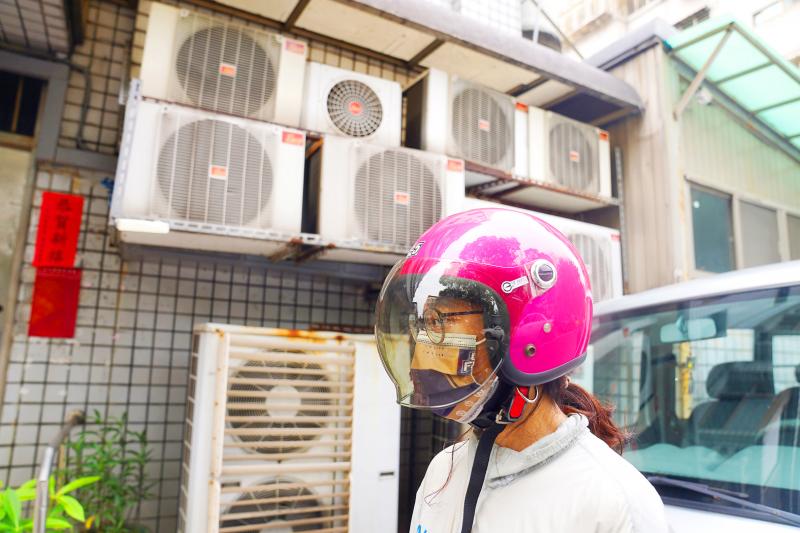The power supply system yesterday flashed a “yellow” alert after a coal-fired generator in Taichung broke down earlier in the day, state-run utility Taiwan Power Co (Taipower, 台電) said.
At noon, power consumption nationwide reached 36,604 megawatts (MW), or 91 percent of capacity, triggering the “yellow” alert, signaling an operating reserve margin of 6 to 10 percent of total supply, Taipower said.
The maximum power supply yesterday was 39,838MW and, during periods of peak consumption, the operating reserve margin was expected to fall to 7.67 percent of total supply, or 2,838MW, it said.

Photo: CNA
The No. 9 generator at the Taichung Power Plant went offline at about 4am yesterday due to a pipeline shutdown, but the power supply was not interrupted for long, because the plant’s No. 6 generator was activated and connected to the grid at 8:20am.
For this month, Taipower said that it raised its projected daily average peak power consumption from 35,000MW to a range of 37,200MW to 37,500MW.
The operating reserve remains at 7 to 8 percent, but power rationing is not likely, despite the tight supply, it added.
Taipower had predicted a tight power supply for this week, saying that a “yellow” alert was expected from yesterday to Friday, mainly due to heavy demand, as well as generators undergoing annual maintenance at four of its power plants.
In Keelung, maintenance on the Hsieh-ho Power Plant’s (協和電廠) fourth oil-fired generator is to be completed on June 17.
In Kaohsiung, maintenance on the Hsinta Power Plant’s (興達電廠) No. 2 gas-fired generator is to be completed on June 28, while maintenance on the Dalin Power Plant’s (大林電廠) No. 6 gas-fired generator is to be completed on July 11.
In Taoyuan, work on the Tatan Power Plant’s (大潭電廠) No. 6 gas-fired generator is to be completed on July 19.
To ensure a stable supply of power, Taipower has increased purchases of electricity from private utilities and asked companies that use a large amount of electricity to reduce their consumption after 4pm, when solar panels no longer produce electricity, Minister of Economic Affairs Wang Mei-hua (王美花) previously said.

Hon Hai Precision Industry Co (鴻海精密) yesterday said that its research institute has launched its first advanced artificial intelligence (AI) large language model (LLM) using traditional Chinese, with technology assistance from Nvidia Corp. Hon Hai, also known as Foxconn Technology Group (富士康科技集團), said the LLM, FoxBrain, is expected to improve its data analysis capabilities for smart manufacturing, and electric vehicle and smart city development. An LLM is a type of AI trained on vast amounts of text data and uses deep learning techniques, particularly neural networks, to process and generate language. They are essential for building and improving AI-powered servers. Nvidia provided assistance

STILL HOPEFUL: Delayed payment of NT$5.35 billion from an Indian server client sent its earnings plunging last year, but the firm expects a gradual pickup ahead Asustek Computer Inc (華碩), the world’s No. 5 PC vendor, yesterday reported an 87 percent slump in net profit for last year, dragged by a massive overdue payment from an Indian cloud service provider. The Indian customer has delayed payment totaling NT$5.35 billion (US$162.7 million), Asustek chief financial officer Nick Wu (吳長榮) told an online earnings conference. Asustek shipped servers to India between April and June last year. The customer told Asustek that it is launching multiple fundraising projects and expected to repay the debt in the short term, Wu said. The Indian customer accounted for less than 10 percent to Asustek’s

‘DECENT RESULTS’: The company said it is confident thanks to an improving world economy and uptakes in new wireless and AI technologies, despite US uncertainty Pegatron Corp (和碩) yesterday said it plans to build a new server manufacturing factory in the US this year to address US President Donald Trump’s new tariff policy. That would be the second server production base for Pegatron in addition to the existing facilities in Taoyuan, the iPhone assembler said. Servers are one of the new businesses Pegatron has explored in recent years to develop a more balanced product lineup. “We aim to provide our services from a location in the vicinity of our customers,” Pegatron president and chief executive officer Gary Cheng (鄭光治) told an online earnings conference yesterday. “We

LEAK SOURCE? There would be concern over the possibility of tech leaks if TSMC were to form a joint venture to operate Intel’s factories, an analyst said Taiwan Semiconductor Manufacturing Co (TSMC, 台積電) yesterday stayed mum after a report said that the chipmaker has pitched chip designers Nvidia Corp, Advanced Micro Devices Inc and Broadcom Inc about taking a stake in a joint venture to operate Intel Corp’s factories. Industry sources told the Central News Agency (CNA) that the possibility of TSMC proposing to operate Intel’s wafer fabs is low, as the Taiwanese chipmaker has always focused on its core business. There is also concern over possible technology leaks if TSMC were to form a joint venture to operate Intel’s factories, Concord Securities Co (康和證券) analyst Kerry Huang (黃志祺)